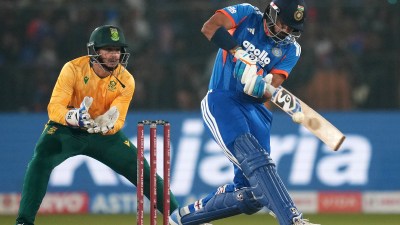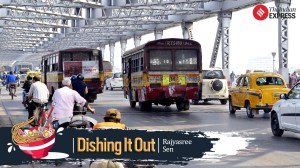Srinagar Sherdils Take The Power Play
At the scenic grounds of Delhi Public School in Srinagar,Waseem Qazi,a cricketer from Zawoora,a village in south Kashmirs Shopian district,has come in to open the innings.
A cricket league modelled on the IPL opens opportunities for Kashmirs cricketers
At the scenic grounds of Delhi Public School in Srinagar,Waseem Qazi,a cricketer from Zawoora,a village in south Kashmirs Shopian district,has come in to open the innings. Running in to bowl is Abid Nabi Ahangar,a strapping six-foot-two-inch bowler,a Ranji Trophy player and Kashmirs most famous cricketer. Very few spectators expect what follows the ball disappears outside the stadium,not once,but many times. Qazi scores 81 runs from just 53 balls,including two sixes and two fours off Nabis one over.
In the past two summers,Qazi,like many other youth of Kashmir,was out on the streets of Shopian,hurling stones in protest against the alleged rape and murder of two women in the district. Today,though,he doesnt hurl stones,only bats fabulously,taking his team to the final round of the Kashmir Premier League. This is the Valleys first-ever T20 cricket tournament,modelled on the Indian Premier League (IPL),and organised by the Army and the state government. The team names have a flamboyance familiar to IPL fans: Shopian Super Kings,Budgam Badshahs,Srinagar Sherdils,Ganderbal Gladiators and Kupwara Knights,among others. The Army sponsors the teams,and provides them cricket kits,and even refreshments.
In April this year,when all eyes were on the IPL,in a remote village in Handwara in north Kashmir,the commander of the Armys 15 Corps,Lt Gen Syed Atta Hasnain,announced the idea of KPL. The motto of organising the KPL is to identify talent in the Valley and select two,three or four players who could play in the national team. Over the last two months,more than 1,000 players from 193 teams have played in over 300 matches in almost all districts in the Valley. The final round of the league will have 14 teams fighting it out in 50 matches,with the final match on August 3.
Twenty-four-year-old Qazi is among those playing in the final round,and represents Shopian Super Kings. A post-graduate student of information technology,Qazi was introduced to cricket when he had just learnt to walk. His father,Nisar Ahmad,who was selected for J&Ks Ranji team in 1985 but could not play the tournament as it coincided with his wedding,wanted to realise his cricketing dream through his son. He thrust the bat into Qazis hands when he was a toddler. Two years after Qazi was born though,militancy erupted in the Valley. As it was unsafe to play outside,Qazis father turned the foyer in their house into a cricket field. My father and uncle would place a small mat and bowl at me. I would bat for several hours. That was my first playground, he says. Qazi later played for the local Shopian team but never got a chance to play in the state team. For him,the KPL is a welcome platform. It has provided us an opportunity to showcase our talent. It will revolutionise cricket in Kashmir. The players have started to take cricket seriously now, says Qazi,who started as a middle-order batsman,and graduated to being an opener in T-20 cricket. He occasionally bowls as well. I am used by my captain to break partnerships, he says.
Its not just budding players from remote districts who see KPL as a big opportunity. More than four Ranji players,representing Jammu and Kashmir,are playing in the tournament. This is a great opportunity for us as well, says Raja Saleem,a 27-year-old right-hand fast bowler from militant stronghold Bandipore. Like Nabi,Saleem represents the state in the Ranji Trophy,and has played against top national names like Virendar Sehwag,Yuvraj Singh,Harbhajan Singh and Ashish Nehra,among others. We seldom get to practise cricket in the Valley. KPL will help us hone our skills, he says.
Saleem was five years old when he first saw Pakistan all-rounder Wasim Akram play on television. That day,I decided I should play cricket, he says. His parents,though,wanted him to pay attention to studies and cricket had to take a backseat. It was only when he left for Delhi for a Bachelors degree in medical lab technology that he decided to pursue it again. In 2006,he joined the World Cricket Academy in Mumbai,where his dream came true. At the academy,we were trained by Wasim Akram for two months, he says. A year later,Saleem was selected by the United Arab Emirates to play for its B-team. I was in Dubai for two years (2007 and 2008). I played with several international cricketers there, he says. But I had to come back because of family compulsions. Saleems sister,a doctor,had to get married and his younger brother had to leave home to pursue a career in medicine. In a family of doctors,I was the only misfit. I had to fight for cricket, he says.
Cricket is not seen as a viable career option in Kashmir,unlike in the rest of India. KPL may change that,hopes Khursheed Ahmad Khan,vice-captain of the Bandipore Bisons team. A businessman from Bandipore,Khans first motivation to play cricket was his uncle,a club cricketer. Every Sunday,he would take him to a local stadium to watch the matches. Khan played his first club match 30 kilometres away,in Sopore,when he was 15 and made an impressive debut,taking five wickets for 12 runs. Khan started to take cricket seriously but everything went against his ambition. Belonging to a poor family,Khans parents wanted him to study to become a government employee; their financial conditions were worsening and cricket was leading him nowhere. Khan finally surrendered and opened a garment shop to support his family. After playing cricket for more than a decade,when I look back,I dont find anything to cheer about, says the 25-year-old fast bowler,who credits KPL for his comeback. Besides being the vice-captain of his team,he has started Khan Sports,a cricket club in Bandipore.
Khan also hopes that the KPL would raise the overall morale of the youth in the Valley. When the boys have nothing to do,they turn out on the streets. But because of this tournament,you will see most of them watching the match. There are around 10,000 spectators in every match here, he says.
The street protests of the past three summers have forced the government and the security establishment to invest in sports. Besides KPL,the Central Reserve Police Force (CRPF) organised the first CRPF Cup football tournament in June at the fortified Bakshi stadium in Srinagar,which saw 48 teams participating. For the first time,spectators were allowed inside without being frisked. The J&K Police also organised its own T-20 tournament. Chief minister Omar Abdullah,though,has sought to delink sports from politics,terming the events talent hunts. At the inaugural ceremony of KPL,he said: If this tournament is only a one-off (event),it will give an impression that it is not for our children,it is not for cricket. It will seem like an effort to keep peace in the state after three consecutive summers of unrest.
However,the organisers on the ground are candid. The aim of this league is to channel the energy of the youth in the right direction,to make the people ready for peace, says Col PPS Vaid,an Army officer entrusted with the task of organising the Kashmir Premier League. But Qazi doesnt agree. If something like Shopian (alleged rape and murder case) happens,cricket cant stop people from protesting, he says.
Ironically,cricket in Kashmir was once tied to the conflict. The pitch of Kashmirs only cricket stadium Sher-i-Kashmir Cricket Stadium was the first battleground of separatist politics much before the onset of militancy. On October 23,1983,when India was to play its first cricket match in Kashmir against the West Indies,separatist leaders dug the pitch in protest. Today,thankfully,cricket is being used to promote peace.
- 01
- 02
- 03
- 04
- 05































